Book Twitter is a Cancel-Culture Nightmare
Twitter is not a happy place to begin with, but Book Twitter gives “toxic” a whole new meaning. Anyone who has spent more than a few minutes in this community, dominated by vocal fans of the Young Adult (YA) genre, knows how quickly petty conflict escalates into ruined reputations and careers. The population’s “wokeness” and fierce competition for attention yields an environment where drama is constant, dissent is trampled, and the tiniest slip-up yields a swarm of disapproval and a swift cancellation.
Book Twitter’s cancel-happy tendencies have been documented before (the articles focus on YA Twitter, but at this point Book Twitter and YA Twitter are virtually synonymous given the latter’s monopoly over the community). The rate of accusations and subsequent cancellations has only accelerated since, buoyed by the community’s collective willingness to follow the whims of the first person to launch an accusation. Participants are not inclined to critically examine the charges against the accused—it only takes one unsubstantiated tweet to launch a wave of pitchforks, especially if the “b” word (bigot) is involved. Forget judge, jury, and executioner: Twitter eschews the trial and proceeds directly to the guillotine.
I wanted to take some time to talk about some recent cancellations in the community. In some ways, these are nothing new: the community has been dominated by groupthink, rumor-mongering, and cancel culture for a long time now. But that’s exactly why I think it’s important to keep talking about it, and to bring some balance and nuance to the conversation. Part of Book Twitter’s problem is that it’s very niche and thus often insulated from outsiders, so virulent community behaviors have been normalized. The more these behaviors are brought to light, and the more people realize how unproductive they are, the more people will be willing to speak up and try to change the prevailing culture. So let’s talk about some recent events.
Rattling the Industry
It used to be that Book Twitter’s cultural power only extended to the community itself, not beyond. But as with the rest of Twitter, the level of influence and ability to affect livelihoods has grown significantly over the past few years. In Kat Rosenfield’s 2017 article addressing the toxicity of YA Twitter, she notes:
The scandals that loom so large on Twitter don’t necessarily interest consumers; instead, the tempest of these controversies remains confined to a handful of internet teapots where a few angry voices can seem thunderously loud. Still, some publishing professionals imagine that the outrage will eventually become powerful enough to rattle the industry.
“Eventually” has arrived. Publishers have previously been swayed to make book-related decisions based on public controversy, but online outrage can now also trigger larger upheavals within the companies themselves. Recently two small publishers, Red Sofa Literary and Corvisiero Literary Agency, took major hits and had multiple staff members resign due to Twitter blow-ups sparked by mildly opinionated tweets. My goal here is to discuss the situations with nuance, so let me be clear that these situations are complicated, with relevant facts beyond the instigating tweets. My intention is not to paint the subjects as unequivocal martyrs, but ultimately to argue that the degree of backlash is unjustified.
Dawn Frederick, owner of the small publishing agency Red Sofa Literary, tweeted on May 29th that a gas station near her home was being looted. The following exchange ensued.
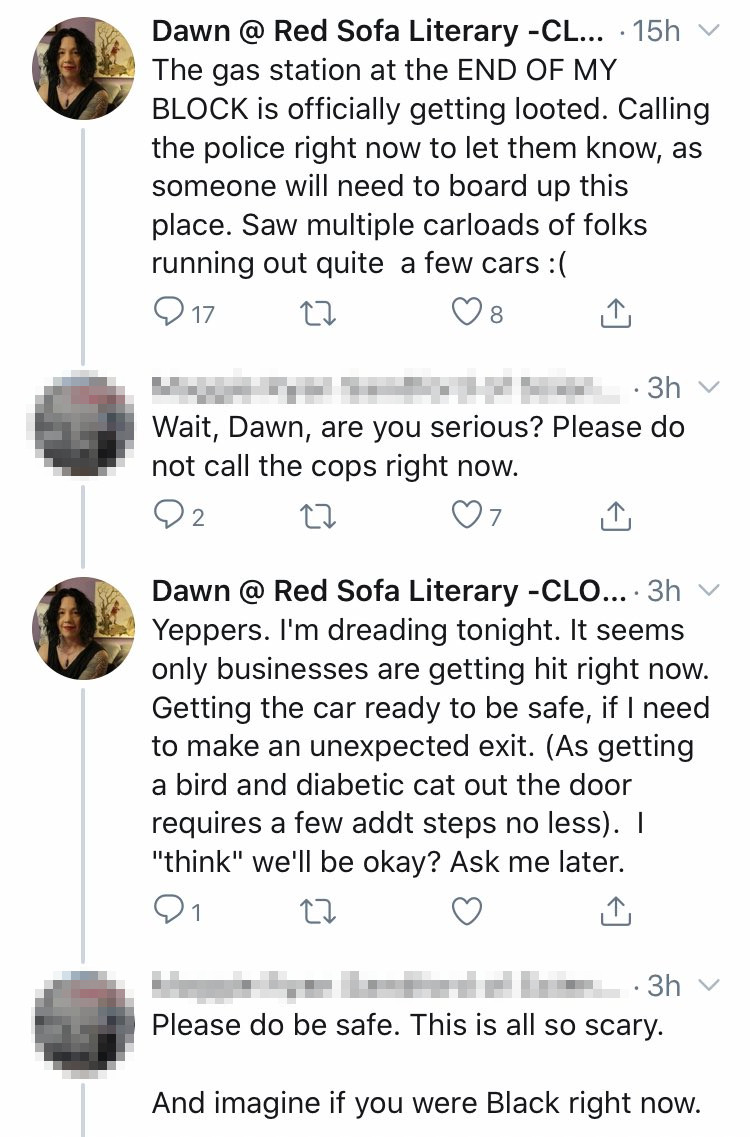
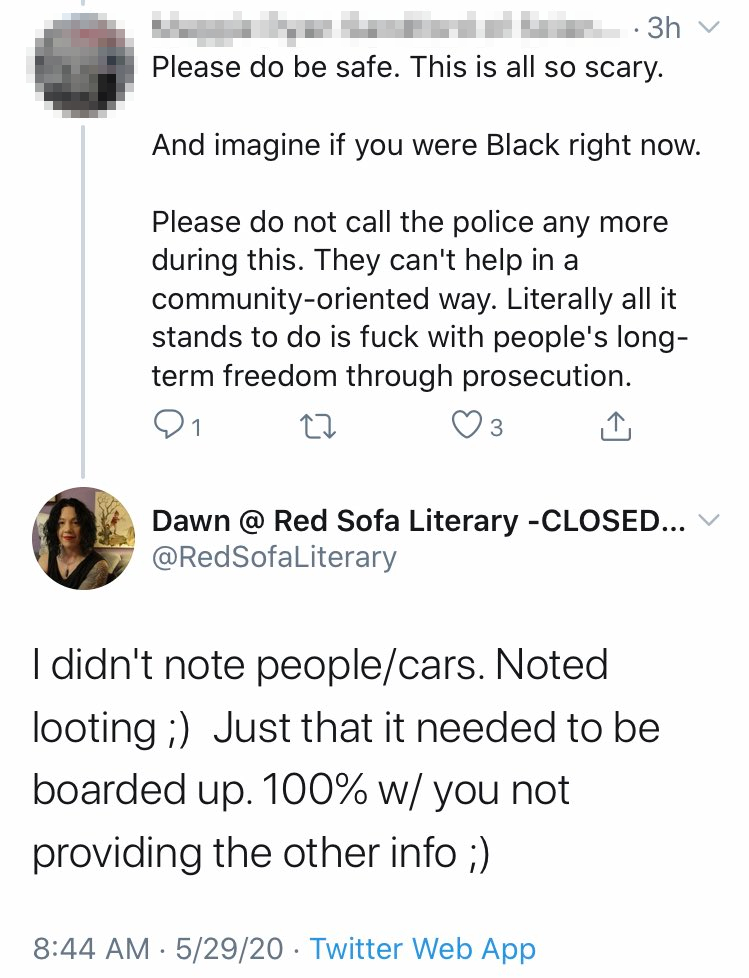
Reading this, I am entirely sympathetic to Frederick’s concerns. A business is being looted, so she calls the police. Not for peaceful protesters, but for looters breaking into a building and stealing carloads of goods. From her follow-up tweet, it’s also clear she’s concerned the looting will spread to nearby residences, including her own. Calling the police is a sensible decision in this scenario. But not so, if you ask Book Twitter. The screenshots above are courtesy of an account that tweeted them out with some snarky commentary implying that Frederick didn’t care about black protesters’ safety:
Owner/agent Dawn Frederick of Red Sofa Literary called cops on people in her Minneapolis neighborhood during the protests last night, said she was prepping to leave in case her home was attacked & when told not to call cops on people p much said they aren’t people just looters ;) She can’t worry about the lives of Black protestors, guys, she’s busy worrying about preparing to evacuate in case these folks invade her home, plus what about the neighborhood gas station’s windows, her bird, and her diabetic cat, don’t you understand priorities??
There are a couple things wrong with a comment like that, other than its classic Twitter pettiness. First, it implies that looting is tolerable if it’s done by protesters, or that looting should be allowed to proceed unchecked in case there are also protesters nearby. Given that looting is a crime that can involve the destruction of entire livelihoods as well as neighborhoods (see also: food deserts), stopping it is a reasonably high priority. Two, the tweet assumes that calling the police is an automatic threat to a black person’s life. This is a topic that’s rife with hyperbole at the moment, perhaps understandably so in the wake of George Floyd’s horrific death at the hands of police, but this is where it’s important to look at the full picture. Unjustified police killings are horrible, but when considered in terms of total police interactions, they are rare. (The Washington Post tracks all fatal police shootings, including those that may have been necessary or justified). This is not to dismiss very real examples of police brutality and excessive force, or to deny the importance of change and improvement. But insisting that the simple act of calling law enforcement is a threat to a black person’s life is a monumental exaggeration, and a disservice to both police officers and the black community.
Regardless, others piled on, accusing Frederick of privilege and racism. Frederick posted a statement on her website trying to clarify that she would never call the police on peaceful protesters, only looters, and that she was an ally of the movement, but Twitter wasn’t having it. Multiple agents resigned, and many authors represented by Red Sofa severed their relationship as well. Frederick then apparently buckled and posted an apology on her website, expressing that she hadn’t realized the consequences of her actions, and that her “actions were tone-deaf and the product of [her] own privilege.”
If she thought a mea culpa would save her reputation, she was sorely mistaken. Soon after, an author who had worked with Frederick’s agency posted an account on her blog that described Frederick as an unpleasant, inconsiderate boss who unjustifiably yelled at the author and lied about why. The account is quite detailed and seems plausible, although Frederick almost certainly has a different version of events. To Twitter this served as further justification for Frederick’s cancellation. Assuming the anecdote is true, and that it represents a pattern of behavior, Frederick may be guilty of being an “asshole boss.” That seems to me a fair reason to avoid working with her. But the post came out after the backlash was already in full swing, and after more than one Red Sofa agent had already resigned. It’s a completely separate complaint, and this is why it’s important to evaluate each accusation’s validity individually. The primary accusation and cause of the resignations was that Frederick was racist for calling the police on looters, which is an absolutely ludicrous statement in any place beyond the wokest corners of Twitter.
Is she a nasty boss? Maybe. But there’s no evidence to suggest that she’s a racist.
Frederick subsequently sent cease-and-desist letters through her lawyer to former agents and associates who called her racist. This move might have made sense if she hadn’t already given an in-depth apology which referenced her privilege and how “the authors and agents who may now question whether or not we share the same ideals have every right to feel this way.” She undermined both her legal case and reputation by caving in the first place (the apology is still posted on her site), and the flip between unreservedly admitting fault and fighting back makes her seem inconsistent at best. Remember: never apologize if you’ve done nothing wrong. Regardless, any sort of litigation is unlikely to change the fact that Frederick is now blacklisted and will probably struggle to find anyone willing to work with her. If that’s due to her treating authors/employees badly, and it’s confirmed as a pattern, avoiding collaboration with her may be reasonable. If it’s due to unfounded accusations of racism, it is not.
Elsewhere in the Twittersphere, Marisa Corvisiero, founder of Corvisiero Literary, posted the following in regards to Black Lives Matter protests: “Make your point, take a stand, and don’t hurt other people or damage property in the process. No violence is acceptable ever. The whole point is to be heard and seen to help make things better.” I think it’s fair to say that this is an objectively reasonable stance, likely held by a majority of Americans: peaceful advocacy for change is good, but violence is bad. The tweet indicates support for the protests as a whole: “taking a stand” to “help make things better.” Nevertheless, the backlash was harsh and swift. Multiple staff members resigned in response to the tweet. Corvisiero then laid off the rest of her staff, explaining that her tweet had attracted vehement criticism and she didn’t want them to be “caught in the crossfire.” Former staff subsequently released the following statement:
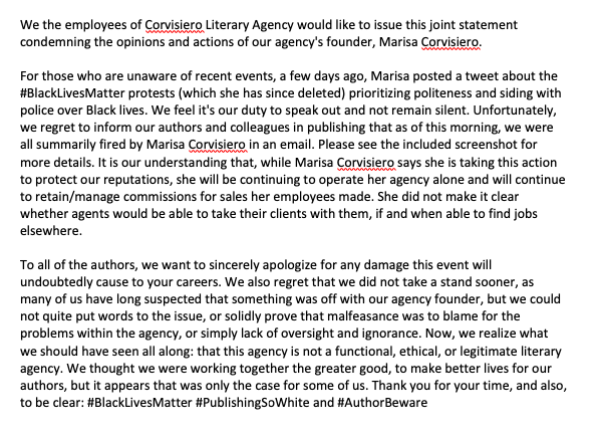
Here Corvisiero was lambasted for “prioritizing politeness and siding with police over Black lives.” Note that Corvisiero made no mention of the police in her original tweet, only the potential for people to be hurt. Even if she had indicated support for the police, this is not a zero-sum game where any sympathy for good police officers means a lack of support for Black lives. Black-and-white thinking is a counterproductive yet increasingly common feature of Twitter blow-ups and politics in general. The accusation of “prioritizing politeness” is perhaps most jarring of all. If opposition to violence is reduced to “politeness,” does it then follow that violence is mere “rudeness?”
Some also cited Corvisiero’s signing of Maze Runner author James Dashner as a reason for departure. This is a layer of cancellation beneath the cancellation, so to explain this element of the controversy, we need to rewind a few years to an infamous early-2018 comment thread on the School Library Journal website. The thread contained dozens of #MeToo allegations of sexual harassment against male authors. Many comments were posted anonymously and offered little to no detail on the substance of the accusation. While many allegations were likely true (albeit unspecific as to the degree of harassment), liars and trolls could just as easily chime in to spread misinformation. The page was an unmoderated free-for-all where anyone could post an accusation and have it considered true by the industry at large. Dashner was mentioned as a harasser in several comments, but few offered any detail whatsoever on his alleged wrongdoing (nor can it be confirmed that the comments were from distinct people). The most detailed comment alleged the following:
I would like to clarify that the harassment/abuse from James Dashner was not a one-time unwanted touch or a joke I took the wrong way. It entailed months of manipulation, grooming and gaslighting. He offered to be my ‘mentor’ using praise and flattery of my writing, and promises to use his connections to help elevate my career to the level of his. But it was all a bait and switch. When I made it clear that I was not going to give him what he wanted in return, our ‘mentorship’ relationship ended.
It should be clear that this type of accusation is highly subjective. “Months of manipulation, grooming, and gaslighting” refer to Dashner’s compliments and offers of mentorship, which are rendered retroactively evil in the accuser’s eyes since she believes his attention was only for the purpose of obtaining romantic or sexual favors. She offers no evidence for knowing “what he wanted” or for how she indicated that she was not going to give it to him. For all we know, Dashner could have organically lost interest in mentoring her and she could have assumed the worst of him. For all we know, she could have misinterpreted his intentions, or could be straight-out lying (as much as I’d like to #BelieveWomen, women do lie sometimes, and in the anonymous comment section we can’t even be sure that the accuser was a woman). Even if Dashner truly was interested in a romantic relationship and terminated a mentorship once he was rebuffed, I’d argue that’s not harassment. An asshole move, perhaps, but not fitting for the “sexual harassment” label if he did not make unwanted sexual advances.
Another comment indicated that he “put his hand on a woman’s thigh,” which is a slightly more concerning accusation, but without details, context, or evidence, this is also questionable. In any case, none of the accusations in the thread were investigated or confirmed, but they were all assumed to be both true and unforgivable. The book community’s willingness to believe nebulous accusations without proof or examination is considered a feature, not a bug, and anyone suggesting due process or evidence is told they are “part of the problem.”
To be clear on my stance here, sexual harassment is unquestionably bad. However: experiences are subjective and complex, the bar for “harassment” is low, people can lie, and a chaotic anonymous comments section is not the place to mete out justice. This is exactly what due process and evidence-based analysis are for. For this case, I think it’s important to note that the allegations against Dashner remain unproven, and even if true do not seem commensurate with the revilement he still receives from the Book Twitter community.
While emphasizing that he had not intended to hurt anyone, Dashner apologized for “not honoring or fully understanding boundaries and power dynamics” and pledged to do better. He was dropped by his then-publisher, Penguin Random House. Some unknown time after, Corvisiero Literary made the decision to sign him on. This came to mainstream Book Twitter’s attention on April 27th, when a user posted a screenshot of Dashner’s profile from the agency’s website and asserted that Corvisiero was neither a good agent nor a good person for representing the author. He also called Dashner a “sexual predator” (quite the hyperbole given the sketchy accusation) and scolded onlookers for not retweeting the information.
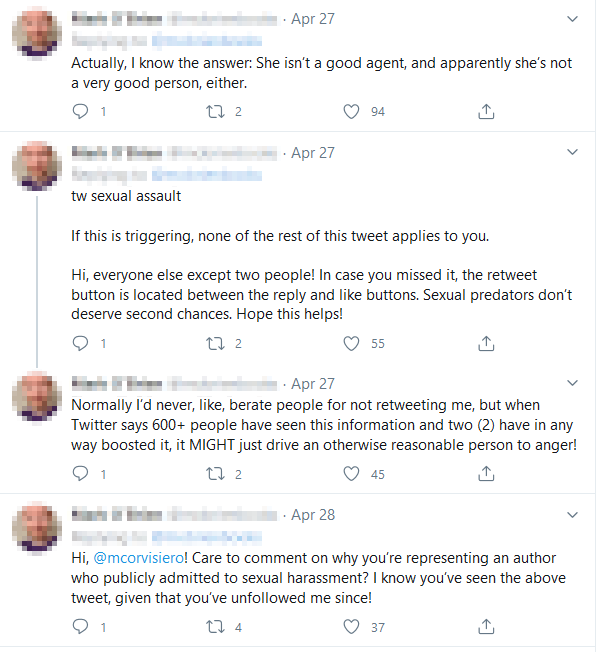
Despite the heat of that controversy, it’s notable that most Corvisiero Literary resignations happened after Marisa’s tweet about the protests went viral, not after Dashner’s initial signing. The former staff of Corvisiero Literary claim they had “long suspected that something was off with our agency founder,” but most of them seemingly didn’t feel strongly enough about it until Book Twitter took out their pitchforks. Now that they’ve thrown their disgraced former boss under the bus, they’re moving on to jobs at other agencies. No word on what Corvisiero herself will do next.
Saved by the Fuck-You Money
Given Corvisiero’s controversial representation of James Dashner, we’ve touched on what happens to an author who gets cancelled. Typically their reputation is ruined, they’re dropped by their publisher (with no guarantee of being picked up by another), and they’re shunned by the book community at large. I should note that Dashner, a highly popular author at the time of his cancellation, didn’t have his career destroyed entirely. He was picked up by a new publisher, even if its future is now uncertain. His Twitter is still quite active with fans anticipating his next book (presumably they either weren’t aware of the accusations, didn’t believe them to begin with, or have accepted his apology), even as others call for him to be permanently boycotted. This is the benefit of being well-known prior to cancellation—it’s survivable rather than life-ruining. Popularity is proportional to both the breadth of the backlash and the chances of recovery.
Speaking of popular authors, let’s address the Hungarian Horntail in the room: JK Rowling. Much has already been said about Rowling’s tweets and follow-up post, so I’ll keep it brief. The TL;DR is that Rowling tweeted out an article and criticized it for using the phrase “people who menstruate” instead of “women.” She followed up with a thread emphasizing that she supports trans people, but it’s important to acknowledge that biological sex is real. Shortly after, she also published a post that addressed her opinions and concerns in more detail. Twitter exploded in rage and disgust with each subsequent post, infuriated that the author of the beloved Harry Potter insisted on being what they call a TERF, or trans-exclusionary radical feminist. Insults were hurled, teeth were gnashed, and a few Harry Potter collections were allegedly thrown away (I don’t believe they actually did it). The complaint is that Rowling’s comments were transphobic. They were not. Rowling took care to emphasize that she “knows and loves” trans people, but that doesn’t erase biological sex. This seems quite reasonable. I disagree with certain points in her essay, but we don’t have to agree on everything to conclude she’s not a bigot. Quite a few trans people seem to agree.
One reason it’s fascinating to watch the Rowling blow-up is that Rowling is conspicuously woke in other contexts: retroactively announcing Dumbledore is gay, as the most notorious example, or casting a black woman to play Hermione in The Cursed Child. So for Book Twitter, this is not your everyday cancellation: it’s a betrayal, in the form of disagreement with woke orthodoxy, from someone they were convinced was ideologically “on their side.”
The other reason it’s particularly entertaining to watch is that Rowling is realistically impossible to cancel. You’re talking about the author of one of the most famous, most beloved, most lucrative book series ever. She could drop-kick a puppy off a cliff and it wouldn’t make a damn difference. She’s still the author of Harry Potter. Sure, Book Riot can stop writing articles about her books and Illumicrate can stop making Harry Potter merch, but it makes no difference in the long run. Her publisher is standing by her, many non-Twitter people are standing by her, and the first Harry Potter book is still on the top bestsellers lists of Amazon and Audible. Short of her being revealed as a serial killer, no one is cancelling JK Rowling, especially not for saying something as uncontroversial-in-real-life as “biological sex is real.”
Bullying is Okay Sometimes
We’ve talked about how publishers and authors have withstood or succumbed to the wave of online outrage. But it’s one thing to watch Book Twitter try to topple publishers, authors, and entities that are public figures, and have some level of power or influence. What’s most revealing is how the community treats its own.
This type of cancellation is both the most stomach-turning to watch and the least well-known outside its niche. A little context is necessary here. “Book Twitter” is a central gathering point for certain very-online book-interested people, so there is a built-in meta fandom for book-related content creators. “Bookstagrammers” are Instagram accounts that post attractively styled photos of books, while “Booktubers” make book-related videos on Youtube, including reviews, rankings, and summaries of books to be read. With the exception of one or two high-profile channels, these are not celebrities, just normal people sharing their thoughts on books. The vibe of these book-centered communities, dominated by young women, is cheerful conversation, pretty aesthetics, and cute readathons. The pleasant veneer stays in place until drama arises, which happens almost constantly.
As a case study, let’s take the example of Rachael Marie, a formerly popular Booktuber who ran afoul of her counterparts. Finding the beginning of the controversy is difficult, as the vast majority of tweets describe her alleged racist nature rather than the facts of what she did. It seems that a well-known black Booktuber hosted a live vigil in honor of George Floyd and the Black Lives Matter protests, after returning from a protest that was allegedly tear-gassed. Rachael Marie tweeted out a screenshot of the vigil with a caption along the lines of “This amazing human, this amazing black human.”
Awkward? Sure. Not the most graceful or well-phrased acknowledgement. But however clumsily executed, her intent was clearly to be supportive of the vigil and its meaning, not to mock it. In fact, she was collaborating with the Booktuber in question to organize a fundraiser for the cause.
What followed amounted to high-school rumor-spreading and consequent character assassination. A teenage girl writes “Judy the Slut slept with the gym teacher” on the bathroom wall, and all the other girls now know Judy to be a slut because the bathroom wall said so, and now that they think about it, she always seemed a little off, and she once winked at one of their boyfriends.
Criticism began to pour in for Rachael Marie, not only for what they perceived as an invasive and performative tweet, but for what they claimed was a history of racist behavior. Her actions were described as “hateful and disgusting.” Multiple Booktuber accounts shared accounts of perceived microaggressions they’d experienced from Rachael. I spent way longer than I should have digging through these accusations, which included the following:
- Comparing the word “smut” (a term referring to risque books/stories) to other formerly derogatory terms such as “queer” and “the n-word” which were reclaimed by communities to be used in a positive way.
- Saying that people shouldn’t be judged for what they read, and that the author can be separated from the work.
- “Let people enjoy the things” in response to the community labeling a book as problematic, and noting that something problematic can be found in every work. Here she was accused of “talking over” minorities who found the work offensive.
- Saying that less popular Booktubers need to have something to offer in order to work with larger, more popular Booktubers.
- Jokingly suggesting that she and another Booktuber should start a Booktube porn channel.
- Using the word “junkie,” presumably as a reference to her liking something a lot.
- Saying that a book about people of color was done well, even though it wasn’t written by a person of color.
- Making a black Booktuber feel tokenized by associating them with books by black authors.
- Liking a tweet about the unproductiveness of cancel culture (ironic, I know).
For this, she was labeled a hateful bigot. I’ll let a sampling of the accusatory tweets speak for themselves.
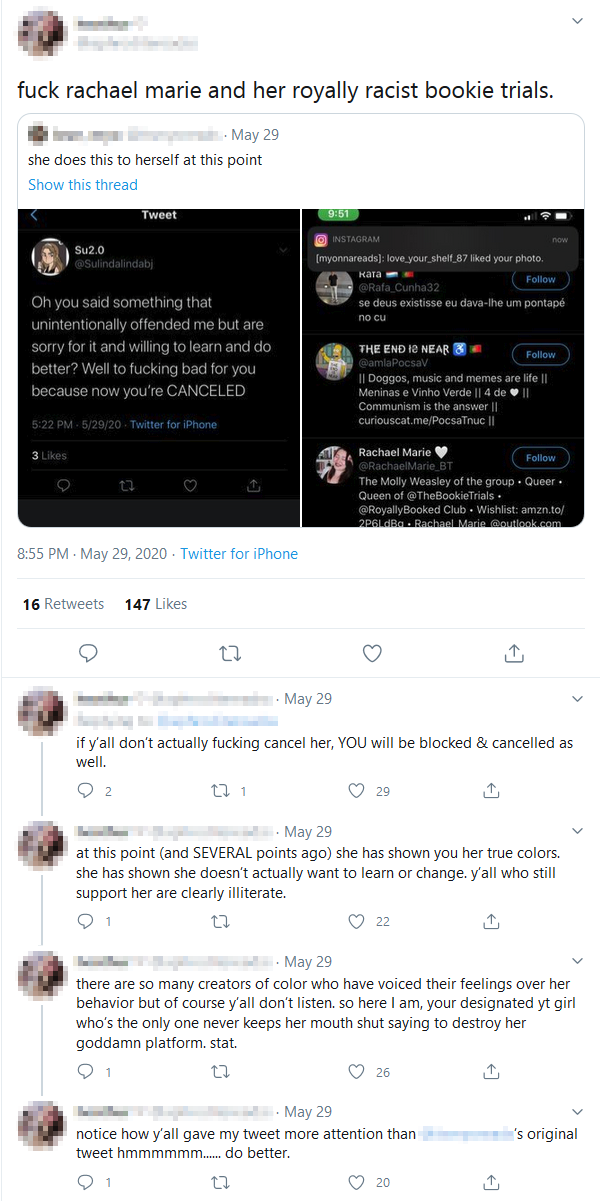
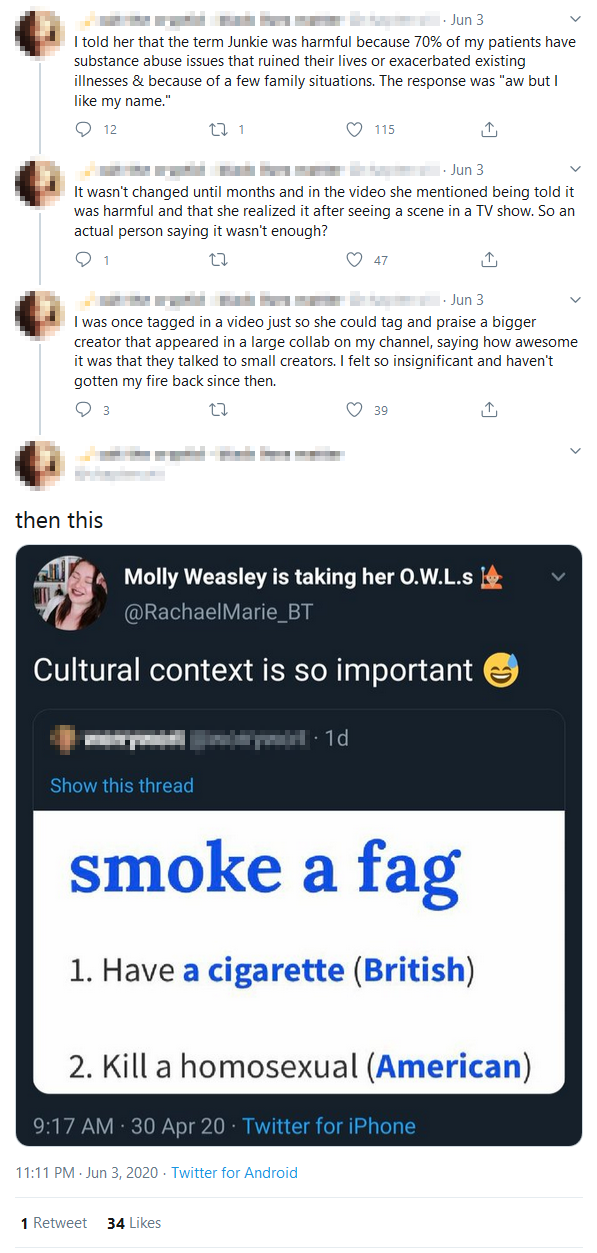

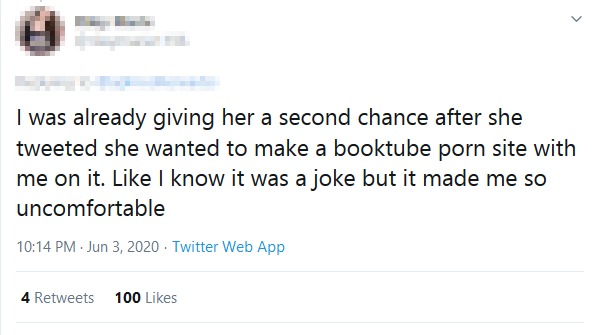

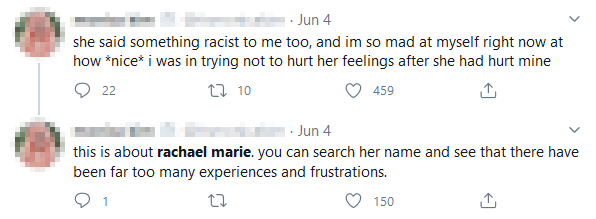
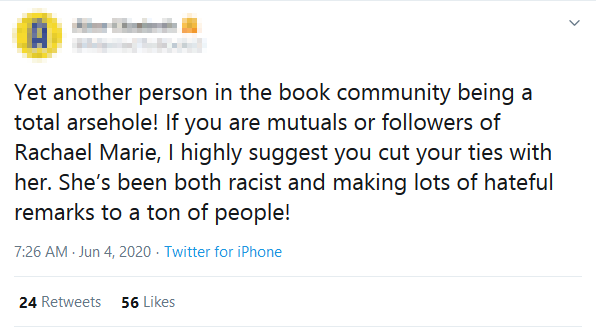
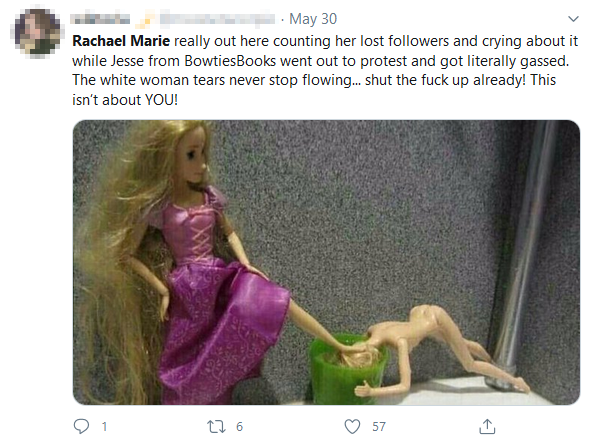
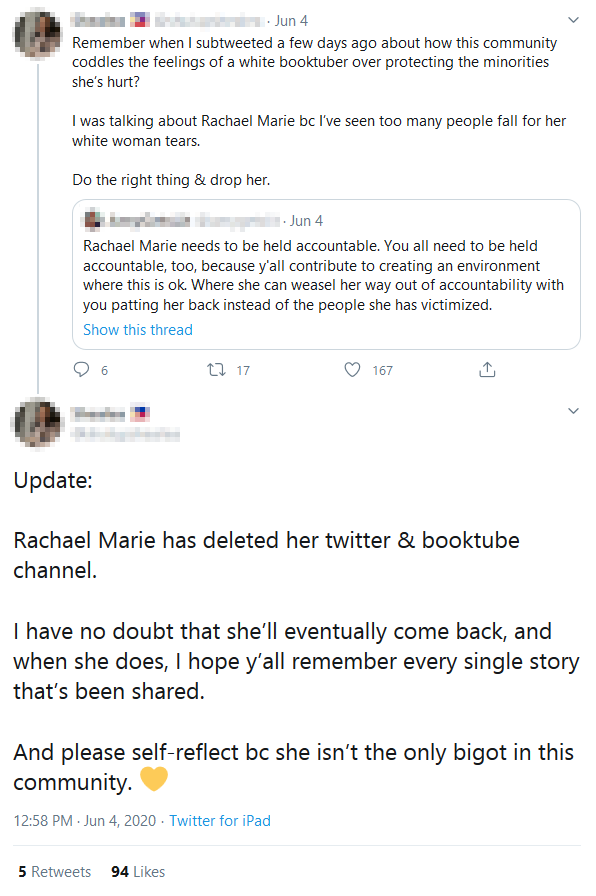


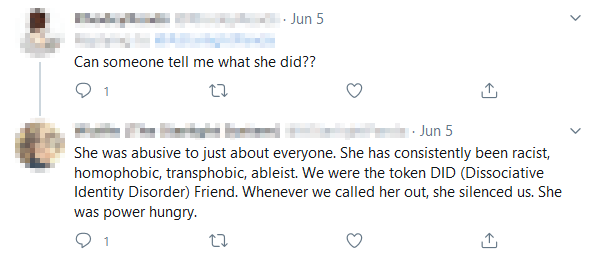

The above is not an exhaustive list of complaints, but every accusation is as impassioned and as hyperbolic. This, by the way, is why many people outside of social justice circles don’t take the concept of “microaggressions” seriously: as long as someone feels offended, literally anything can be a microaggression, and crying wolf over relatively minor things like this make normal people less inclined to be paying attention when there’s actual bigotry.
The unflattering stories of Rachael Marie are evidence of her not being perfectly woke, and sometimes being awkward about loaded topics, but I see no evidence of racism. She sounds like a normal girl, and if anything, one who’s more woke than average. For Book Twitter, she wasn’t nearly woke enough, and the enumerations of her crimes continued, accompanied by a drop in followers and subscriptions. Eventually she posted an apology—”I’ve messed up and I deeply apologize. I’m so sorry.” Shortly after, she deactivated her account, likely overwhelmed by the amount of vitriol being tweeted her way. Her departure introduced a new wave of recriminations for her “cowardice” after having “caused so much harm.”
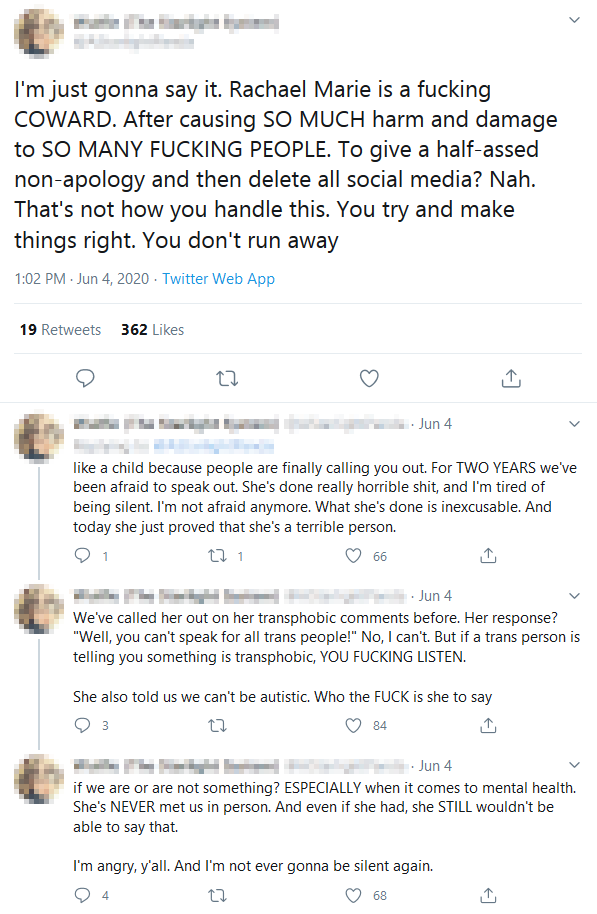
A few criticized her for leaving social media before clarifying what would happen to the BLM fundraiser she helped organize, and some implied she was trying to run off with the money.
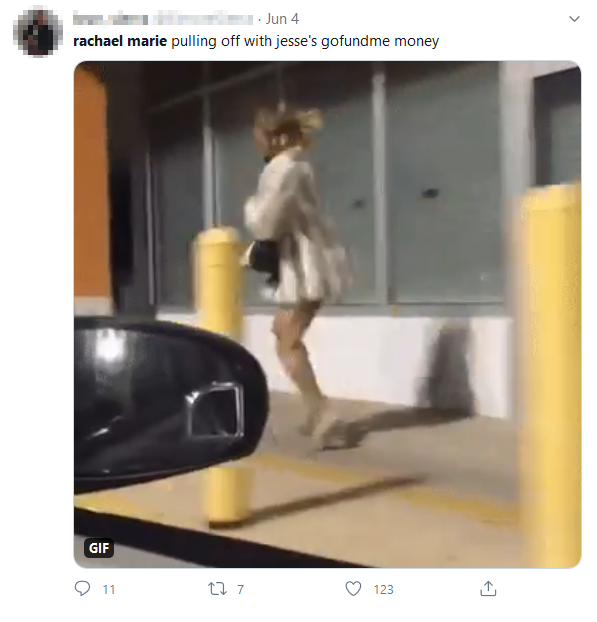
I mean, obviously the first thing on a girl’s mind when she’s being dogpiled on social media is logistics. I’ve no idea why she didn’t stay and sort things out. Everyone is so understanding and forgiving, after all.
Meanwhile, anyone who objected to the summary excommunication of Rachael Marie was reprimanded and piled-on until they deactivated their account, made it private, or simply gave up. Anonymous accounts defending her were mocked as being sock puppets for Rachael Marie herself. I came across the following exchange between one of the accusers and a rare person willing to question the culture of cancelling for minimal offenses.
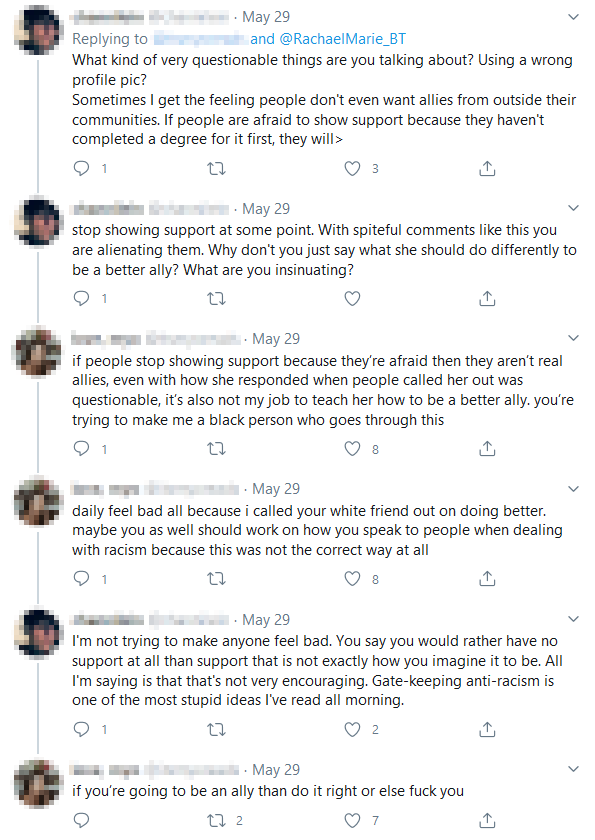
This is a perfect discussion of what journalist Jesse Singal calls “feel-bad liberalism,” or focusing on (often pretty minor) things that liberals should feel guilty about, rather than significant, tangible things that they can do to help. It encompasses the idea that not only should you feel bad for your identity and imperfections, but it’s not anyone else’s job to “educate” you. Basically you’re a piece of crap, so do better, but if you mess up while trying to do better, you’re even more of a piece of crap and deserve to be cancelled. “If you’re going to be an ally than [sic] do it right or else fuck you.” I cannot imagine how this kind of logic will ever be productive or encourage someone to join the cause.
Speaking of driving people away, there’s something particularly notable about the doubling-down on accusations after Rachael Marie deactivated her accounts. The accusers had clearly won: they got an apology from her and drove her off social media. But that wasn’t enough. They insisted that she should stay and endure waves of people telling her what a disgusting person she is. This is an incredibly disingenuous demand. It’s easy to criticize while sitting comfortably uncancelled, safe on the side of the majority. If the crowd came for them, it’d be a different story. Even if Rachael Marie had stayed online, it wouldn’t have made a difference; her accusers likely wouldn’t have been satisfied no matter what she’d done. How many cancellations can you think of where the angry mob reversed course, said “that’s okay, pal” and went about their business because the apology was good enough?
Nowadays, a few weeks after the blowup, Rachael Marie’s social media is still all deactivated. She’s still referenced from time to time as an ongoing in-joke, as if her initial online humiliation wasn’t enough.
If you’re not already a part of Book Twitter, you might wonder why you should care about the woke mean girls of a niche community. Why is this important? Because it’s a microcosm of this cultural moment. It’s classic Twitter cancel culture on steroids, because while the general Twitter cancellation is usually counterbalanced by differing views, there’s almost no one that dares to dissent within the book community. I do believe that the voices driving the McCarthyist accusations and feel-bad liberalism are in the minority, but they have a firm chokehold on the rest of the community. Book-related social media is populated primarily by young women, most of whom are agreeable, are often insecure or anxious, and want to make the world a better place. This makes them extra susceptible to going along with cruel tactics, because they’re told over and over that it’s for the greater good. Speaking out publicly would require not only the strength and inclination to withstand a great deal of insults, recriminations, and rage, but also a deep confidence that you’re in the right to speak against a population that frames itself as morally pure because it supposedly furthers the cause of social justice. Many denizens of Book Twitter, young women or otherwise, don’t have either of those characteristics, and I can’t say I blame them.
(Why do you think this blog is anonymous? Let’s be honest: no one wants to spend their day being sniped at for microaggressions on Twitter.)
You might argue that what Book Twitter did to Rachael Marie is neither illegal nor against the platform’s rules, and that anyone with a significant online profile needs to be prepared to withstand harsh criticism. While it’s true that this sort of behavior isn’t technically prohibited, that doesn’t make it any less mean-spirited, nor any less hypocritical coming from people who preach tolerance. I also don’t think it’s necessarily reasonable to expect that an average young woman running an innocuous YouTube channel about books should be prepared for an online mob to come trample her for the “harm” she caused.
The emphasis on “harm” is one of the most interesting psychological features of modern-day wokeness. Every accusation hinges on a type of sweeping hyperbole that’s surprisingly widely accepted: “this interaction made me feel uncomfortable, so it was deeply harmful.” I do think some cancellers emphasize how much alleged emotional damage was inflicted because they enjoy the sympathy and cultural power they have as “victims,” but I think the more fundamental reason has to do with cognitive dissonance. They know on some level that what they’ve done is unkind—like the rest of us, they see themselves as good, nice people—so they need to find a way to justify it, to frame it as good versus evil. They need to believe that the “harm” the person caused is greater than the harm they inflicted on her, that her apparent insensitivity justifies the lack of mercy they showed to her. It’s all in the name of justice, after all. Just take it from this tweet, referring to another cancelled Booktuber.

The ends justify the means, right? Especially if it’s a transphobe.
Some cancellers, often the ones talking the loudest, are chasing clout or doing it because they enjoy the power of ruining someone’s reputation. But the sad truth is that I think many of them truly believe it’s a necessary evil to make the world less racist. Misguided belief doesn’t make them any less culpable for cheering on the cancel mob, but it’s sad nonetheless. They fail to realize that putting more hatred and anger into the world makes it worse, not better. This is especially true when the person in question never did anything significantly wrong, and by all appearances tried to support the community’s purported ideals of inclusivity.
Rachael Marie wasn’t perfect by any means. Some of the stories shared about her may point to genuine insensitivity or character flaws. But everyone has their issues, and she didn’t deserve the treatment she received.
Until more people realize what’s happening and are more willing to condemn bullying behavior, the weekly excommunications will continue. Book Twitter has already moved on to new targets. One offender posted a video in defense of JK Rowling, an unheard-of infraction within a community whose high-profile members have roundly condemned the author as a transphobe. She’s the subject of the apparently pro-bullying tweet I shared above. The Booktuber in question, Hannah Tay, was determined to express her point of view, and she’s proving difficult for the cancellers to chase off.
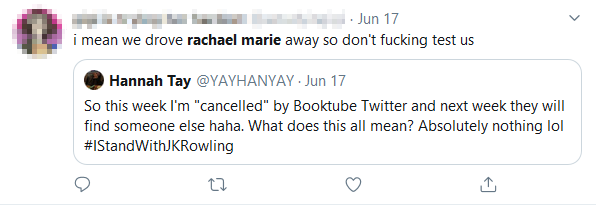
Of course, that doesn’t stop them from trying. They are more convinced than ever that the holy war against microaggressing, politically incorrect, TERF-defending members of the community must continue at any cost. To them, this is further proof that their unhealthily woke niche is bigoted to the core. Meanwhile, members of the community strain to prove how deeply anti-racist and committed to the cause they are, hoping not to be next on the chopping block.
Just remember: sometimes bullying is okay, as long as the person disagrees with you.
If you enjoy my work, please consider supporting me on Ko-fi.